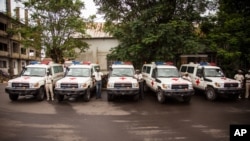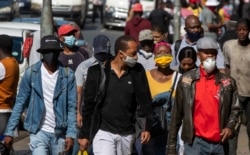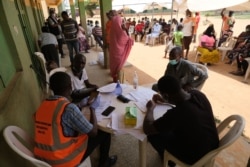Field hospitals, ambulances, ventilators, masks and even personnel are among the hundreds of millions of dollars’ worth of assistance the U.S. has recently diverted to African nations in their fight against the coronavirus pandemic. VOA’s Anita Powell spoke exclusively with Assistant Secretary of State Clarke Cooper of the Bureau of Political-Military Affairs about how U.S. peacekeeping operations are finding creative ways to empower African nations to fight the virus. She reports from Johannesburg.
As the African continent girds itself for what experts say is an inevitable tide of coronavirus cases, the U.S. government is trying to find creative ways to quickly render assistance. Those include repurposing existing peacekeeping assets like field hospitals and medical equipment to fight the virus.
“There's medical equipment that has been applied, as well as training, delivered to partners like Ghana, Rwanda, Senegal and Uganda for participation in international peacekeeping," said Assistant Secretary of State Clarke Cooper, of the Bureau of Political-Military Affairs. "And so, what we have assessed is that, of course, when times are tough — and they are right now, particularly with the COVID pandemic — we wanted to bolster these capacities, but also remind partners like Ghana, Rwanda, Senegal and Uganda that a true friend lends a helping hand in times of crisis. And we are proud to be the No. 1 provider on humanitarian assistance to countries worldwide.”
This is, he notes, not the first time the U.S. has diverted peacekeeping supplies to fight a viral war. In 2014, the U.S. did the same in response to West Africa’s Ebola epidemic.
“If one looks back at the 2014 Ebola crisis, that is where the Department of State and the Department of Defense sought to apply flexibilities on field hospitals, ambulances and equipment, as well as training packages in places that were impacted. And that actually did provide us a template for now, for 2020. So, six years later, we're able to look back at how we reapplied resources that were either already fielded or were already identified to be fielded in Western Africa and Central Africa at the time. So, it certainly did provide us, again, the kind of a template for what we're doing today,” said Cooper.
Additionally, the U.S. has given approximately $270 million worth of bilateral assistance to fight the virus, including more than $30 million to Nigeria; more than $26 million to the Democratic Republic of Congo; more than $23 million to Ethiopia and nearly $22 million to South Sudan.
And in South Africa, the continent’s viral hot spot, the U.S. government recently donated nearly 730,000 protective masks for health workers, as well as about 1,000 ventilators.
But what, we asked Clarke Cooper, do these efforts have to do with keeping the peace on a continent battered by insecurity? "More than you’d think," he said.
“It is not in the normal space of security cooperation work," he said. "However, it is part of a broader long-term investment in each other. And so, we certainly want to make sure that our partners have the capacities not only for their sovereignty and their self-defense, but to maintain their capacities as far as being a partner with us on security.
So, what we're doing here does provide significant long-term dividends for us collectively. I mean, when we look at the virus like terrorism, for example, it does not know boundaries. It does not respect geopolitical borders. And so, the virus affects everyone, and it does not spare anyone. So, reapplying what we can does allow for us to, again, not only maintain capacities, but also help each other in a time of extremis.”
And these, he said, are nothing, if not extreme times, in Africa and around the globe.










